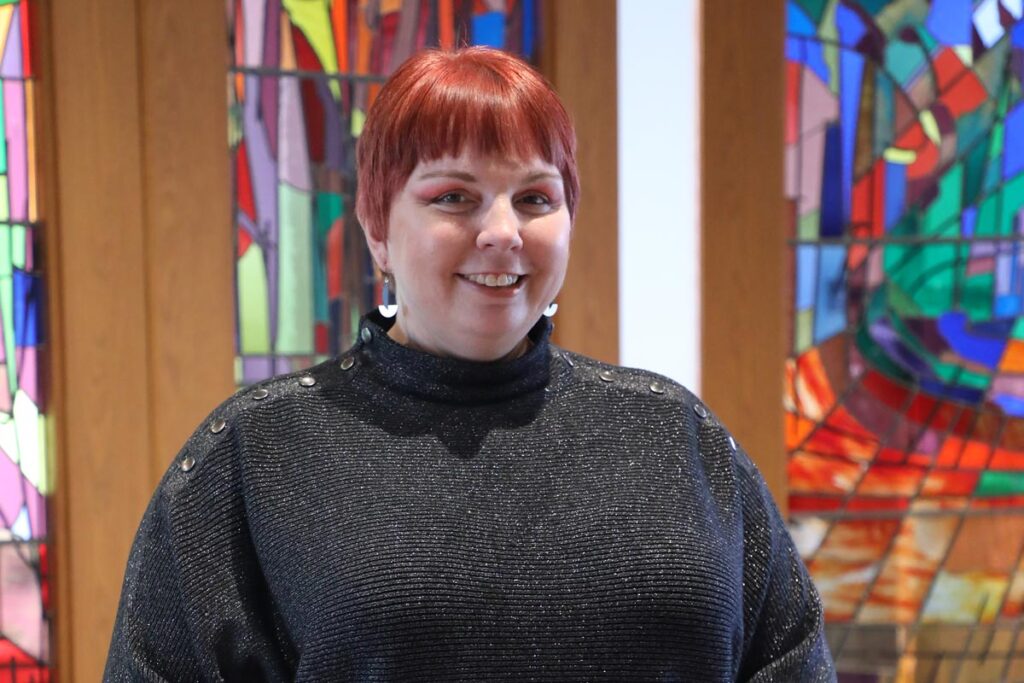In the Fullness of Light: How LSTC’s Queer Symposium and Homecoming Offer a Sacred Space for our Community

By Rhiannon Koehler
What if joy itself is an act of defiance? What if the simple act of gathering—of speaking, learning, and celebrating—becomes a radical assertion of dignity? These are the questions that animate the 2025 Queer Intersectionality and the Public Church Symposium at LSTC. Held alongside Homecoming, this year’s symposium doesn’t just offer a space for reflection; it invites participants into a living, breathing conversation about the intersections of faith, identity, and justice. Here, queer theologians, activists, and faith leaders come together not to provide easy answers, but to ask the kinds of questions that can foster sustainable, meaningful change.
The Birth of the Queer Intersectionality and the Public Church Symposium
The Queer Intersectionality and the Public Church Symposium at LSTC was developed by Dr. Karri Alldredge, Assistant Professor of New Testament, in response to student calls for deeper engagement with LGBTQIA+ identities in theological education and ministry preparation. It is sponsored by The Rev. Dr. Albert “Pete” Pero, Jr. and Rev. Dr. Cheryl Steward Pero Center on Intersectional Studies and Thesis 96, a student group that shares a common belief that Lesbian, Gay, Bisexual, Transgender, Queer, Intersex, Asexual and other sexual and gender minorities have the right to full participation in church, particularly the ELCA, including ordination. “The symposium is a concrete way for LSTC to live out its commitments to being a queer seminary where the gifts of queer folx are celebrated and essential to engaging the work of the gospel” says Alldredge, who has shepherded the symposium from idea to institutional movement. “It invites students to move from engaging with written theology and theory to embodied dialogues and relationship building.” More than an academic exercise, the symposium is an extension of LSTC’s Public Church commitment, fostering community, wisdom-sharing, and supporting concrete actions for justice.
The Power and Purpose of Queer Joy
This year, the symposium’s speakers and participants will be working around the theme Queer Joy as Resistance. “Queer joy as resistance highlights the importance of joy in the lives of queer folx, celebrating their many acts of resistance and creativity,” Alldredge explains. “Queer joy resists the notion that the lives of queer folx are only based in experiences of violence and trauma. It is a political statement, a counter-response to anti-trans/queer ideologies.”
The symposium’s theme also recognizes joy as a tool of collective liberation. “As [American writer, professor, philosopher, intersectional feminist, poet and civil rights activist] Audre Lorde highlights, joy fuels action and transformation,” says Alldredge. “Queer joy refuses to be silenced or erased. It delights in embodiment, intersectional justice, and transformation.” This year’s programming embraces joy not as an abstract concept but as an active force—one that sustains resistance movements and deepens faith-based activism.
Key Voices and Transformative Conversations
A major highlight of the symposium is its lineup of renowned scholars, activists, and faith leaders. Among them are Roberto Che Espinoza and Erin Law, co-founders of the activist group known as Our Collective Becoming. Dr. Espinoza, a non-binary transqueer Latinx scholar-activist and visionary thinker, will deliver a plenary address and lead workshops on sustainable community-building and activist theology. Law will guide participants in exploring the embodied, somatic experiences of queerness through workshops and performances. “We are intentionally centering focus on the church’s role in promoting and protecting trans and non-binary joy, especially in our present political climate,” Alldredge notes.
Workshops are structured into two tracks: Developing Awareness and Developing Resistance. “These workshops range from queering liturgy and interrogating allyship to queer intersectional activism to trans joy and the role of the church,” says Alldredge. The symposium challenges attendees to move beyond statements of support to embodied actions for justice. “LSTC, like much of the ELCA, needs to move beyond prayers and statements to concrete action… Alongside our commitments to anti-racism and the global church, we must demonstrate publicly and concretely our commitment to trans and queer rights.”
Homecoming and the Power of Community
This year, the symposium is intentionally intertwined with Homecoming, an annual event celebrating LSTC alumni and the broader seminary community. By holding these events together, LSTC emphasizes its commitment not only to current students but also to queer alums and the broader faith community.
“Alumni panels and presence will help foster connections between present students and alums as well as to develop greater networks of collective action within the ELCA,” says Alldredge. Homecoming participants will have full access to the symposium, allowing for meaningful intergenerational conversations about faith, justice, and advocacy.
The schedule includes class reunions, student creative expression workshops, and affinity group gatherings, culminating in an awards reception that honors distinguished alumni. Worship and prayer remain central, reflecting the deep theological grounding of both events.
A Call to Engage
The 2025 Queer Intersectionality and the Public Church Symposium and Homecoming are not just events—they are a call to action. They invite participants to move beyond passive support into embodied practices of justice and solidarity. “The symposium seeks to help participants develop and share skills for survival, thriving, and collective action,” Alldredge affirms. “It asks that communities move beyond the words of welcome statements and social media posts to embodied actions and intentional relationship-building to foster the kin-dom of God here on earth.”
For those who believe in a faith that is active, inclusive, and justice-driven, this gathering at LSTC offers a powerful space for learning, connection, and transformation. It is a call of community, a reaffirmation of dignity and belonging, and a reminder to all that LSTC remains a safe space for all of our community members to celebrate the fullness of their authentic selves.